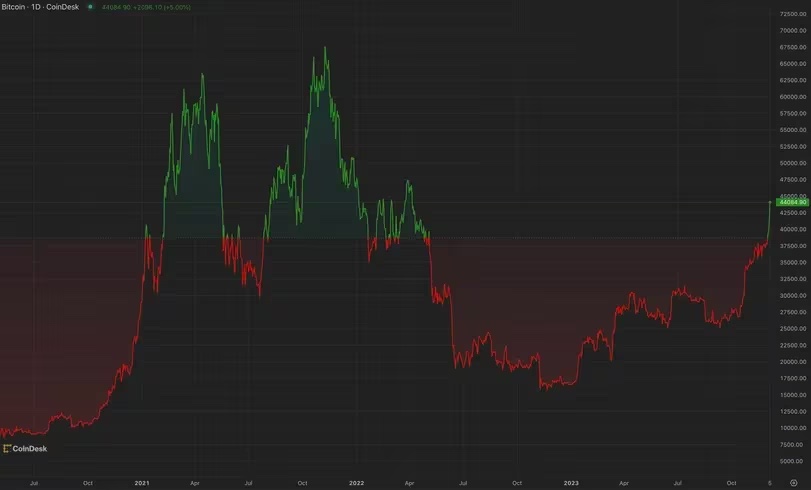
About two years ago, crypto asset (virtual currency) prices reached their peak. Bitcoin (BTC) was about to hit $70,000. Then things got worse and worse, and chaos descended. Bitcoin sank towards $15,000 in the aftermath of the FTX collapse.
You probably remember too!
Prices rebounded for much of 2023, but it appeared to be a hard-won rally, with gains quickly followed by pullbacks. In mid-October, the price of Bitcoin was around $27,000.
Then, the market caught fire, fueled by optimism for Bitcoin exchange-traded funds (ETFs) and falling interest rates. Bitcoin at one point reached $45,000 on Coinbase. It just crossed $40,000 a few days ago for the first time since early 2022.

 Bitcoin price after 2021 (CoinDesk)
Bitcoin price after 2021 (CoinDesk)A friend of mine who is skeptical about crypto assets sent me a message a few days ago saying he was thinking of buying more Bitcoin. He says his colleagues are hearing from people wanting to learn about crypto assets. Will this situation continue? Are crypto assets showing signs of movement towards the mainstream again?
To the dismay of my father, who has relied on my 20-year career in markets and finance to ask me for predictions, I have no idea. But we do know that the last time crypto markets were in such a cheerful mood was two years ago. That was before Celsius Network, Voyager Digital, Three Arrows Capital, FTX, Genesis and others collapsed.
FOMO (Fear of Missing Out) seems to be back mixed with YOLO (You Only Live Once).
Wall Street is coming to crypto assets
It’s not hard to see why things have gotten so heated. It’s a real deal that Wall Street heavyweights BlackRock, Fidelity, and Franklin Templeton are planning to list a Bitcoin ETF in the United States.
If approved by regulators, anyone with a brokerage account should be able to buy Bitcoin ETFs. And by all appearances, a Bitcoin ETF is likely to be approved soon. For the average American, it’s easier and probably more practical than opening a Coinbase account or understanding how a DEX (decentralized exchange) or MetaMask works.
In other words, the sales and marketing power of BlackRock, Fidelity, and Franklin Templeton appears poised to back a Bitcoin ETF. It is not surprising to think that this will lead to a large influx of funds into crypto assets. However, whether this will lead to sustained price increases is debatable.
There are two other things I’m concerned about:
The future is difficultdebut
After FTX went bankrupt, many people were wondering if something bad would happen to its giant rival Binance. American regulators and law enforcement seemed to have Binance under siege. We recently got the answer.
Binance has agreed to pay a hefty $4.3 billion settlement to resolve multiple investigations. Founder Changpeng Zhao has resigned as CEO. However, despite all the concerns that have arisen up to this point, the industry is taking the situation calmly.
Zhao’s successor, CEO Richard Teng, recently gave his first public interview, but his debut did not seem to go smoothly. Mr. Ten gave the impression of being evasive. Binance did not disclose its headquarters, and Teng was vague on other issues.
The question is whether this matters. Maybe traders don’t care if the world’s largest crypto exchange takes an ambiguous stance?
Strongest correlation in crypto assets
It may seem like an old saying by now, but Elon Musk’s words and actions move the price of Dogecoin (DOGE), his long-time favorite meme coin. It happened again.
According to regulatory filings, Musk is seeking to raise $1 billion to develop AI (something he has since denied). As a result, Dogecoin skyrocketed. One of the strangest correlations in the market still stands.
|Translation and editing: Akiko Yamaguchi, Takayuki Masuda
|Image: Shutterstock
|Original text: This Bitcoin Rally Feels Different. FOMO and YOLO Seem to Be Back
The post There’s something different about this Bitcoin rise — FOMO and YOLO seem to be back | CoinDesk JAPAN appeared first on Our Bitcoin News.

 1 year ago
81
1 year ago
81














 English (US) ·
English (US) ·